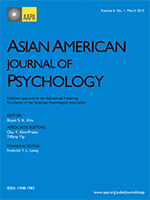Convention News Highlights:
- Register by July 21st! Prices go up for on-site registration.
- Want to plan your Convention day? Download the schedule.
- Researchers & clinicians are invited to join together at a special lunchtime networking session, titled “Writing Case Studies: Highlighting Practice-Based Evidence and Evidence-Based Practice.” The event, co-sponsored by the Asian American Journal of Psychology and the AAPA Practice Task Force, will discuss the journal’s new guidelines for case study submissions. For more information:
- Are you a clinically-oriented researcher seeking to increase your publication record and collaborate with research-oriented clinicians?
- Are you a clinician with interesting case material to share but limited time and resources to publish?
Case studies provide practical examples of culturally-informed approaches to service delivery that can be evaluated alongside the research literature to inform treatment decisions. In a growing field such as Asian American psychology, case studies also may be especially helpful for exploring understudied phenomena and generating hypotheses that may be explored in future research. We encourage participants to come prepared to discuss ideas for case studies and present areas of expertise that they could contribute to the shaping of others’ case studies. Students are welcome!
In this lunchtime interactive session, we will:
1. Present the guidelines and requirements for submission of case studies to the AAJP Case Study Section.
2. Develop ideas for case studies highlighting innovative approaches to service delivery involving Asian Americans.
3. Provide opportunities to network and meet potential collaborators that can help bridge gaps in research and clinical practice.
TO REGISTER: Email the AAJP Case Study Section Editor, Doris F. Chang, at changd@newschool.edu and provide the following information:
1. Name and job title
2. Area of expertise
3. What kinds of case studies would you be interested in working on? (Examples: case studies involving kids and families; treatment of depression; spiritually-focused interventions; applications of mindfulness)
4. What kind of concrete assistance would be helpful? (Examples: information about the latest research on X to help ground my literature review; access to library databases or statistical help; consultation on a case formulation; help with taking my case notes and turning them into a paper; someone to edit my work)
5. What kind of assistance can you provide?
6. Do you have an idea for a case study that you wish to workshop or discuss during the session? (Y/N)


